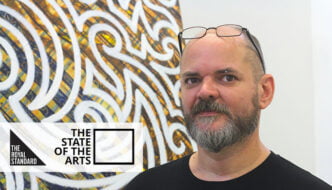
All photography credited to Anthony Robling
The Machine Stops is a short story written by E.M Forster in 1909, set in a dystopian world where people live underground and have become dependent on technology – The Machine – for their every need. Forster explores this symbiotic relationship and how it changes human society.
Playwright Neil Duffield has adapted The Machine Stops for the stage, which debuts at York Theatre Royal, Fri 13 May – Sat 4 Jun 2016.
DC: The Machine Stops is a short story of 12,300 words. What were your initial impressions of the book?
ND: I was astonished that in the days before even radio had become a mass medium, Forster had managed not only to envisage technologies like the internet and Skype, but more importantly, to explore with amazing foresight the effect such technologies could have not only on our relationships with one another, but on our individual minds and bodies, our philosophy and culture, on our very sense of being.
DC: Has adapting it for the stage been a difficult process, or has E.M. Forster’s writing enabled a smooth transition?
ND: As regards to adaptation for the stage, in terms of its plot, characters and themes, the story requires very little adaptation and I decided to remain as faithful to the original as possible. The main problem I faced was how to convey to an audience the many descriptive passages in the piece which are an essential part of the story. In discussion with the director, Juliet Forster, we took the decision not to attempt any kind of literal portrayal of the complex technological world Forster envisages – but to try to create the impression of it in the minds of the audience via a combination of movement, words and music.
 DC: E.M. Forster is largely known for his novels: A Passage to India and A Room with a View both dramatized for screen. What would draw fans of his work to this production of The Machine Stops, considering sci-fi is seen as a niche genre?
DC: E.M. Forster is largely known for his novels: A Passage to India and A Room with a View both dramatized for screen. What would draw fans of his work to this production of The Machine Stops, considering sci-fi is seen as a niche genre?
ND: I don’t really see The Machine Stops as sci-fi. What’s common to all E.M. Forster’s work is his concern for human values and relationships and this is no exception. The story is a very personal and intimate one about the relationship between a mother and her son, yet its themes involve our whole existence as a human race and are more relevant today than they were in Forster’s life time – simply because the technologies he could then only imagine are now part of all our lives and we’re only just beginning to develop a glimpse of how that might affect us and where it could possibly lead.
DC: E.M. Forster wrote his visionary short story in 1909, pre television. What conclusions can you make – from your involvement in The Machine Stops – about the future of humans and technology?
ND: There are a numerous and obvious benefits from the sort of technology which has become so integral to every one of us. But there are dangers too and it is to these that The Machine Stops draws our attention. We need to be warned and to take them seriously unless we wish to see the kind of individual isolation and break-down in direct contact with other humans beings that is so central to Forster’s story.
Buy your tickets for the show here!




Comments